| Reviews & Columns |
|
Reviews DVD TV on DVD Blu-ray 4K UHD International DVDs In Theaters Reviews by Studio Video Games Features Collector Series DVDs Easter Egg Database Interviews DVD Talk Radio Feature Articles Columns Anime Talk DVD Savant Horror DVDs The M.O.D. Squad Art House HD Talk Silent DVD
|
DVD Talk Forum |
|
|
| Resources |
|
DVD Price Search Customer Service #'s RCE Info Links |
|
Columns
|
|
|
Mistral's Daughter
Worthless junk that's at least watchable during its first half...and then it's all downhill from there. E1 Entertainment has released the blockbuster (at least in the ratings) 1984 CBS miniseries, Mistral's Daughter, based on the equally popular novel by 80s heavyweight lightweight, Judith Krantz. A three-disc, seven hour-plus melodrama marathon that's alternately ponderous and hilarious, Mistral's Daughter at least has the presence of way overqualified Stacy Keach strutting around, bespeckled with paint as the half-crazed superstar painter, Mistral, to keep our attention. But headliner Stephanie Powers is seriously miscast as super model Maggy, the toast of Paris in the madcap 20s, and once her main romance with turpentine-stained beast Mistral is over, and the second generation of kids take over the screen time, ho boy does this mini grind to a halt. Sumptuous costumes, sets and location work are compromised in this fair-to-middling transfer, unfortunately.
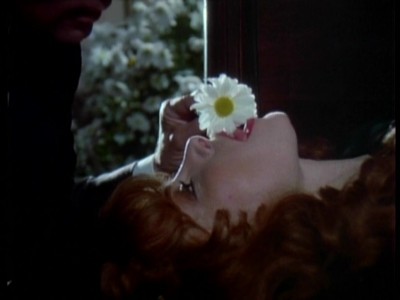
Give credit where credit is due: Krantz did come up with a page-turning story...maybe it reads better than it plays. Country mouse Maggy Lunel (Stefanie Powers) steps off the train from Tours onto the wild, decadent streets of 1925 Paris, and plants herself down, waiting for a painter to offer her a modeling job (I'm not making this up). Razzed by Kiki (Annie Jouzier), the queen of the Parisian models, Maggy's defiance attracts poor-but-arrogant genius Julien Mistral (Stacy Keach), a painter who hasn't sold one work, but who is convinced he will some day be an artist of world renown. He also sees something in that mane of fiery red hair of Maggy's, and invites the terrified girl back to his studio - just to pose - but her modesty eventually enrages him and he throws her out. Befriended by former "model," Paula Deslandes (Stéphane Audran), Maggy soon learns the ropes of modeling - including dropping trou - quickly becoming the undisputed queen of the models. Rescued by Mistral from a wild party, the two become lovers - a first for Maggy - and Mistral, in a fit of sexual and artistic release, paints Maggy's portrait, unleashing a new passion in his work that was lacking when New York heiress-turned-sculptress-turned-patron, Kate Browning (Lee Remick), first took his work to influential gallery owner, Adrien Avigdor (Ian Richardson).
Arrogance, egomania, and an all-consuming dedication to his art lead Mistral to betray Maggy, who finds solace in the arms of wealthy American businessman, Perry Kilkullen (Timothy Dalton), who "keeps" the beautiful Maggy in a sumptuous apartment. Eventually, the two have a baby...which would be fine if only Perry wasn't married to strictly orthodox Catholic, Mary Jane (Alexandra Stewart), who refuses to give Perry a divorce, wishing him instead to "rot in hell" for siring a bastard child to Maggy when she is barren. Meanwhile, back in Montmartre, Mistral is fast becoming a one-hit wonder after his spectacular debut at Adrien's exhibition. Unable to work because of Maggy's departure, he finds temporary - but loveless - solace in the arms of Kate, who uses her money and her influence to propel Mistral into the forefront of the world's greatest painters. But overwhelming personal and political events (namely Maggy's move to America and the beginning of WWII) threaten to buffet Mistral's single-minded pursuit of artistic excellence, with devastating consequences for all Maggy's and Mistral's paths intertwine once more.
SPOILERS ALERT!
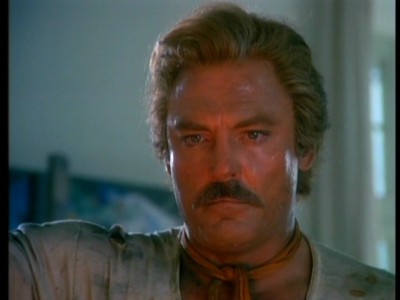
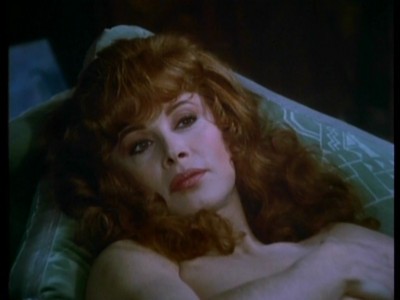
Do they even make miniseries - true, multi-night, multi-hour miniseries - anymore for network TV? I've always had a fondness for the format, particularly back during the 70s when the genre was still relatively new, and when those massive "novels for television" offered a "special event" buzz to network schedules back when TV was the uncontested king of media entertainment. Later, as the format became overused and it developed conventions (and eventually clichés) of its own, it became popular to dismiss miniseries as tacky, pulpy exercises in unrestrained melodrama (an aesthetic state that offers rewards of its own). However, when the form was treated with respect by the filmmakers, when it was utilized correctly to maximize the form's inherent strengths - more screen time should equal more time to develop story and characters - then a well-executed miniseries could deliver an impact that few movies could match. For instance, director Dan Curtis' sustained, unrelenting Holocaust sequences in the massive War and Remembrance mini exceed anything I've seen in any fiction work (including Spielberg's Schindler's List), while ABC's more inclusive treatment of John Steinbeck's East of Eden trumps the more venerated Elia Kazan version just by virtue of its tackling more of the novel (that, and a stunning turn by Jane Seymour).
However, I found very little of any of that "respect for form" taken with Mistral's Daughter's production. While Krantz's story provides enough plot for five films, the character list remains relatively small. And those characters aren't so much developed and explored, as they are merely put through the twisty plot's paces. We're told Maggy is a young innocent, and we see her eventually become the owner of a successful modeling agency, but none of her scenes inbetween hit home on any kind of valid dramatic level. This is serialized soap opera, pure and simple, and while I don't have a problem with that format, either, Mistral's Daughter seems to want to say something extra about, among other themes, artistic expression, loyalty, and love and rejection, none of which approach anything more than a superficial airing through the predictable characters and the telegraphed situations. Its episodes directed by both Douglas Hickox (Theatre of Blood, Brannigan) and Kevin Connor (those wonderfully campy Doug McClure sci-fi/fantasy outings like The Land That Time Forgot and At The Earth's Core, as well as numerous episodic TV series), Mistral's Daughter is constructed entirely of extremely short scenes designed not only to not tax the supposed short attention span of its audience, but also to fit together easily like a jigsaw puzzle inbetween the really important action: the commercials. Characters literally "go through the motions" because they've only have about three to four minutes per scene before the next set-up, which usually involves completely different characters and locations. Character development is sacrificed to moving the plot along and getting to the next gorgeous set or French location (and the sets and costumes and the location work in Provence, France, are gorgeous - nothing buys gloss and sheen like generous American film and TV budgets).
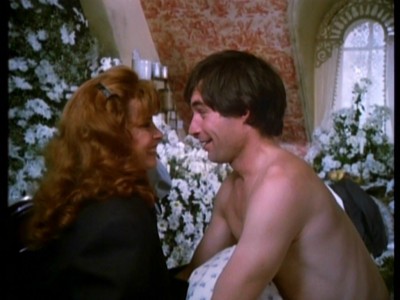
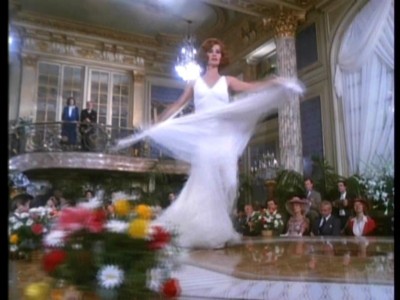
And when the characters do have time to talk, they generate some unintentional howlers. Campy dialogue isn't necessarily a bad thing with a mini like Mistral's Daughter; in some cases, it can be the only saving grace, giving an admittedly tired exercise in melodrama a humorous lift. However, when you combine short, choppy scenes with miscast or misdirected actors, guffaw lines only further distract from a satisfying dramatic experience. If I genuinely believed that 42-year-old Stephanie Powers could pass for a demure 18-year-old French girl, I wouldn't have minded so much when Stacy Keach seduces her by caressing and kissing her feet, moaning, "You have very beautiful feet," to which she replies, in ecstasy, "Oh, Julien! Oh, Julien!" Her responses don't stray from this base line; later, when Julien has made passionate love to her and paints her portrait, covered in paint and kneeling over her in bed, saying, "It's yours. I give it to you," she again cries, "Oh, my love!" Julien, the savage animal/painter, isn't immune to groaners, either. Slapping the manipulative Kate back down to earth, Julien, channeling his inner peasant, imperiously decrees, "But just remember one thing, my clever little American girl ("girl"? The 49-year-old Remick?). You may have bought yourself a lion, but that doesn't mean he will roar whenever you want him to." The topper has to be, though, when he's handed his little girl, Fauve, about whom he exclaims to Teddy, her mother, "Darling, she's a beautiful wild beast!"
Along with sometimes insipid scripting, the plotting breaks down often, as well, with scenes coming and going with too much rapidity, bringing together characters with no context (why is Paula risking her life for Adrien during the Occupation, for example?). Scenes feel like they're missing (such as Dalton's death scene), but considering the inconsistent scripting by Terence Feely and Rosemary Anne Sisson, and chop-socky editing by John Bloom and Barry Peters, we're never quite sure who's to blame for the hazy exposition. Add to that fairly lifeless direction, and I can't muster up much enthusiasm for any element of Mistral's Daughter. Only one scene sticks in my mind, even though I just watched the mini last night, and that's where Dalton runs a daisy along Stephanie Power's (clothed) body, before she delicately kisses it with her lips and tongue before they make love. That kind of erotic and romantic pulse should have infused the whole mini, considering it has a plot heavy with sexual misadventures and decades-long romantic yearning. But alas, that's pretty much it for steamy and dreamy feelings. And once the Maggy-and-Mistral plot line is pushed aside for new generations Teddy Lunel (Stephanie Dunnam) and Fauve (Philippine Leroy-Beaulieu), forget it. Regardless of the time we spend with each character, the two actresses portraying these characters largely lack the charm and magnetism necessary for us to move our primary interest over from pros Powers and Keach (even if she's miscast here, she's still a total pro and quite talented). The mini drones on, as Powers' and Keach's old-age makeup gets progressively sillier and these new, anonymous actors take over, making the first few episodes look quite good by comparison. Unfortunately, with the miniseries form, such a sustained build requires a solid payoff, which Mistral's Daughter lacks. And by the time the last scene abruptly ends, and we realize the story has covered a 50-year time span, we check our watches and wonder if we haven't done the same, as well.
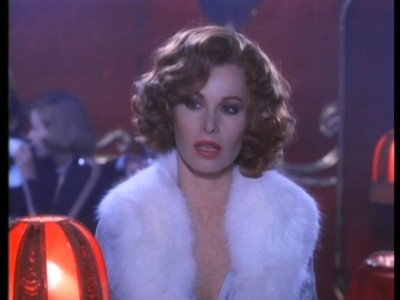
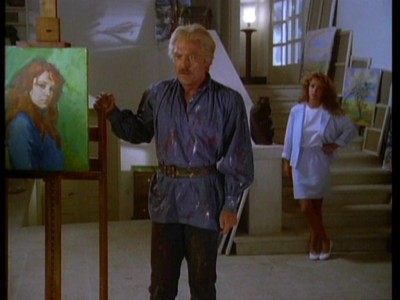
The DVD
The Video
A curious note: the print used for this full-screen, 1.33:1 transfer of Mistral's Daughter is French in origin, although the soundtrack is in English: all of the credits for each episode are in French. Was this the only source available for the complete mini - if indeed this is the complete version? Hard to say, but I wonder if a PAL conversion (since the print is French) is the reason the image is so blurry and fluttery anytime someone moves around the frame (interlacing is quite noticeable). After the first episode, I stepped down to a much smaller monitor, and the image "improved," but clearly, something is up with the transfer. The original elements used here show signs of wear and tear, as well, with a not-heavy but noticeable fading of the color values, and some scratches and anomalies. Not the best presentation of this mini, but perhaps it's the only one available.
The Audio
As with the video, the audio presentation isn't optimal. A generally muddy English mono soundtrack garbles some of the lines, while I swear some of the re-looping for the actors was done by French actors speaking English (watch the scene where Keach first works with Powers; he says a line that sounds canned...which also magically has a French accent, which Keach avoided everywhere else). Subtitles are included, which help.
The Extras
Other than original intros to the documentary by Krantz herself (where she basically explains the entire miniseries to you...twice), there's a new interview with Stacy Keach where he discusses the mini. For my money, Keach was one of the most interesting actors of the 1970s (just check out masterpieces Fat City and Twinkle, Twinkle, Killer Kane), and to put it bluntly - he's vastly superior to this miniseries material. And yet, every time I've heard this actor speak about a project, regardless of what it was (he gave a thoughtful interview for that horror, Butterfly), he's attentive, extremely articulate, and generous to a fault with the project. He's terrific; I'd like to hear more interviews with him. It runs a healthy 18:14 here.
Final Thoughts
Despite the presence of Stacy Keach (who can't help but rise above this material), Mistral's Daughter is miscast with lead Stephanie Powers (who's beautiful and cool and steady, but no wild Frenchwoman). Add to that scenes written as if in shorthand rather than as complete, whole dramatic entities, some...curious dialogue to say the least, and the fatal casting of two less-than-magnetic actors who anchor the last half of this long mini, and you've got a recipe for a ponderous/hilarious miniseries. Unfortunately, it's neither good nor bad enough to be very watchable. A rental of Mistral's Daughter seems appropriate for all miniseries completists, and for the admittedly sensational costumes, production design and the location work - despite the wonky transfer.
Paul Mavis is an internationally published film and television historian, a member of the Online Film Critics Society, and the author of The Espionage Filmography.


|
| Popular Reviews |
| Sponsored Links |
|
|
| Sponsored Links |
|
|
| Release List | Reviews | Shop | Newsletter | Forum | DVD Giveaways | Blu-Ray | Advertise |
|
Copyright 2024 DVDTalk.com All Rights Reserved. Legal Info, Privacy Policy, Terms of Use,
Manage Preferences,
Your Privacy Choices | |||||||













